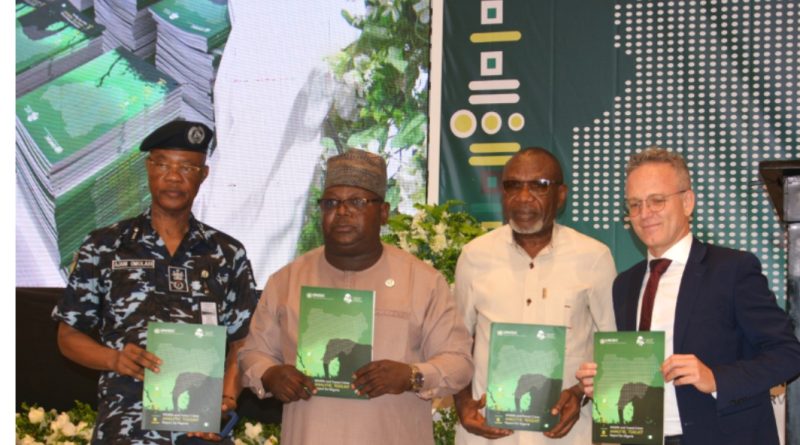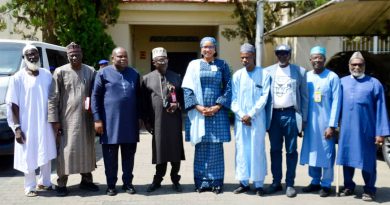Nigeria Unveils ICCWC Wildlife and Forest Crime Analytic Toolkit Findings and Recommendations
Oru Leonard
Wildlife and forest crime is a serious and escalating issue. Recently, Nigeria has become a major transit hub for trafficking illicit wildlife products, including pangolin scales, ivory, and other protected species from Eastern and Central Africa. These products enter the country through porous land borders and exploit Nigeria’s advanced sea and airport infrastructure. To combat these challenges, the Government of Nigeria requested support from the International Consortium on Combating Wildlife Crime (ICCWC) in 2019 to implement the Wildlife and Forest Crime Analytic Toolkit and the ICCWC Indicator Framework for Combating Wildlife and Forest Crime.
The ICCWC Wildlife and Forest Crime Analytic Toolkit enables a comprehensive assessment of a country’s preventive, law enforcement, prosecutorial, and judicial responses to wildlife and forest crime. It reviews data systems, processes, and wildlife demand, identifying strengths and gaps in current responses. The Toolkit provides short and long-term recommendations to address key challenges, offering an evidence base for authorities and ICCWC to enhance national responses to wildlife and forest crime. The results are compiled into a comprehensive report, informing the development of specific work plans for national capacity-building and technical assistance.
The United Nations Office on Drugs and Crime (UNODC) has finalized the findings of the ICCWC Toolkit Assessment for Nigeria. The report outlines 33 recommendations to strengthen Nigeria’s wildlife criminal justice system. Key recommendations include:
Supporting the Endangered Species Protection and Conservation Bill 2024
Scaling up joint wildlife investigations through a Joint Investigations Team, including the Nigeria Customs Service, National Environmental Standards and Regulations Enforcement Agency (NESREA), INTERPOL National Central Bureau, and anti-money laundering agencies like the Economic and Financial Crimes Commission (EFCC) and the Nigerian Financial Intelligence Unit (NFIU)
Establishing a wildlife crime unit in the Directorate of Public Prosecutions of the Federation
Enhancing wildlife forensics capacity building efforts
Providing operational and technical assistance tools and skills for frontline enforcement authorities
The Federal Government, through its Ministry of Environment, has endorsed the ICCWC Toolkit report, and UNODC will support the implementation of its recommendations. The report was launched at an event in Abuja on Friday, 20 September 2024.
The Honourable Minister of Environment, represented by the Director of Planning and Research, Federal Ministry of Environment, Nigeria, noted that while Nigeria has taken several proactive steps to combat wildlife crime, much more needs to be done as wildlife crime is a complex transnational issue that requires a multifaceted approach. He reiterated the commitment of the Government of Nigeria to implement the recommendations in partnership with international and domestic stakeholders.
UNODC Officer-in-Charge, Mr. Danilo Campisi, emphasized the urgency of implementing the Toolkit’s recommendations, citing key data and research trends. The 2023 Organised Crime Threat Assessment for Nigeria and the 2024 World Wildlife Crime Report both highlight the severe depletion of Rosewood in Nigeria, noting that the CITES ban on rosewood exports may have come just in time to prevent the species’ extinction.
Representative of the European Union Delegation noted that the EU considers Nigeria a priority country to support counter wildlife crime interventions. He advised that the recommendations in the report should be taken seriously by the Office of the Minister of Environment, Conservator General of the National Parks Service and other security agencies. He pledged the EU’s support to continue to provide knowledge, skills and wider capacity to combat wildlife crimes in Nigeria.
In closing, the Director of Forestry, Federal Ministry of Environment, Nigeria, Hajara Sami Umar, extended the Government of Nigeria’s appreciation to the International Consortium for Combatting Wildlife Crime (ICCWC), which comprises of INTERPOL, UNODC, World Bank, World Customs Organisation and the CITES Secretariat, noting that the toolkit assessment conducted under their guidance has provided Nigeria with critical insights and actionable recommendations to strengthen national responses to wildlife and forest crime. She noted that ICCWC’s collaboration with the Federal Government of Nigeria is deeply valued and the Government looks forward to continuing the partnership in the implementation phase.
(UNODC Media)
Cover Photo Caption: Stakeholders at the launch of the ICCWC toolkit report in Nigeria holding up a copy of the report




